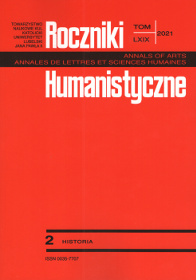Perón, Evita y los derechos políticos de la mujer argentina
Abstrakt
Perón, Evita a prawa polityczne Argentynek
Pierwsza administracja prezydenta Juana Domingo Peróna doprowadziła do nadania argentyńskim kobietom praw obywatelskich. Zarówno Eva Perón, jak i prezydent byli w stanie określić możliwości i potencjał głosów kobiet służący wzmocnieniu partii peronistów. Chociaż Evita nie mogła sprawować funkcji prezydenta, kilka kwestii rozstrzygnięto pod jej wpływem i przywództwem. Co najważniejsze, partia peronistów doprowadziła do uchwalenia w 1947 r. ustawy o prawie kobiet do głosowania. Ponadto inicjatywa nominacji Evity Perón na wiceprezydenta była promowana przy wsparciu CGT. Współpraca między Peronem, Evitą i ruchem robotniczym przekształciła drugą połowę lat 40. XX w. w okres wdrażania argentyńskiej równości obywatelskiej pod względem płci. Prawo do głosowania pozwoliło Argentynkom osiągnąć nowy status, dzięki któremu mogły one wpływać na politykę i życie społeczne swojego kraju, a także na swój krąg rodzinny. W wyborach w 1951 r., pomimo śmierci Evity i jej wcześniejszego „wyrzeczenia się” kandydatury na wiceprezydenta, Juan Perón został ponownie wybrany prezydentem większością głosów kobiet. W 1973 r. Isabel Perón, trzecia żona Juana, została wybrana na wiceprezydenta tuż przed trzecią kadencją męża – kształtując prezydencką formułę Peron‒Peron. Później Isabel została prezydentem Argentyny (1974–1976), jej władzę obalono w wojskowym zamachu stanu.
El primer gobierno de Juan Domingo Perón fué el que sentó la base de los derechos cívicos de la mujer argentina. Tanto Eva Perón como el mismo presidente supieron identificar la oportunidad y el potencial del voto femenino, con el fin de fortalecer las bases electorales del partido peronista y de sus jefes. A pesar que Evita no pudo ejercer un puesto ejecutivo en el marco presidencial, fue ella quien bajo su sombra y liderazgo, se creó el Partido Peronista Femenino, fué sancionada la Ley de Sufragio Femenino en 1947 y promovió junto con la Confederación General del Trabajo (CGT) la iniciativa de su propia postulación a la vicepresidencia. La colaboración entre Juan Perón, Evita y el movimiento obrero, transformaron la segunda mitad de los años cuarenta del siglo veinte en la cuna de la implementación de la igualdad cívica argentina, en términos de género. El derecho de voto femenino ubicó a la mujer argentina en un nuevo status desde el cual pudo influir en el ámbito pólitico y social de su país, aún fuera de su hogar y de su círculo familiar. En las elecciones de 1951, a pesar de la muerte de Evita y del anterior “Renunciamiento”, Juan Perón fue reelecto con mayoría de votos femeninos. Años más tarde, en 1973, Isabel Perón – su tercera esposa, fue electa vicepresidente en vísperas de la tercera presidencia de Juan Perón – conformando la fórmula presidencial Perón‒Perón y posteriormente se transformará Isabel en Presidenta de la República Argentina (1974–1976), por el Golpe de Estado que instituyó la dictadura militar.
Bibliografia
Barry, Carolina. “Eva Perón y la organización política de las mujeres”. En Serie Documentos de Trabajo. Buenos Aires: Universidad del Centro de Estudios Macroeconómicos de Argentina, 2011.
Barry, Carolina. Evita Capitana. El Partido Peronista Femenino 1949‒1955. La Plata: EDUNTREF, 2009.
Bianchi, Susana, Sanchís Norma. El Partido Peronista Femenino. Buenos Aires: Centro Editor de América Latina, 1988.
Ciria, Alberto. Perón y el Justicialismo. Buenos Aires: Siglo Veintiuno, 1971.
Cuaderno de Ayuda. Partido Peronista Argentino. Unidad Básica Femenina Chenaut. Caso No. 16 (1940).
Domingo Perón, Juan. Conducción Política. Buenos Aires: Freeland, 1974.
Domingo Perón, Juan. Doctrina Peronista. Buenos Aires: Macacha Güemes, 1973.
Domingo Perón, Juan. Los Libros del Exilio 1955‒1973. Buenos Aires: Corregidor, 1996.
Golbert, Laura. De la sociedad de beneficencia a los derechos sociales. Buenos Aires: Ministerio de Trabajo, Empleo y Seguridad Social, 2010.
Luna, Lola. “Populismo, nacionalismo y maternalismo: casos peronista y gaitanista”. En Congreso XII de AHILA. Porto, 21-25 de Septiembre 1999.
Navarro, Marysa. Evita. Buenos Aires: Planeta, 1994.
Page, Joseph. Perón. Buenos Aires: J. Vergara, 1984.
Palermo, Silvana. “Quiera el hombre votar, quiera la mujer votar: género y ciudadanía política en Argentina (1912‒1947)”. En C. Barry (comp.). El Sufragio Femenino en América Latina, 1-68. Buenos Aires: Universidad Nacional de Tres de Febrero, 2006.
Parodi, Delia. “Una Mujer en el Congreso”. En Colección Vidas, Ideas y Obras de los Legisladores Argentinos. Buenos Aires: Círculo de Legisladores de la Nación Argentina, 1998.
Perón, Eva. Eva Perón habla a las mujeres. Buenos Aires: Editorial de la Reconstrucción, 1975.
Perón, Eva. Mensajes y Discursos. Buenos Aires: Fundación de Investigaciones Históricas, 1999.
Copyright (c) 2021 Roczniki Humanistyczne

Utwór dostępny jest na licencji Creative Commons Uznanie autorstwa – Użycie niekomercyjne – Bez utworów zależnych 4.0 Międzynarodowe.





